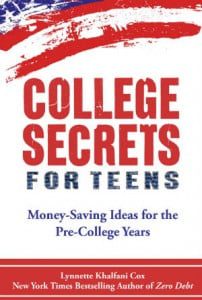Since my oldest daughter entered high school in September, I’m going all out to help her hunt for scholarships and aid her in scoring some free money to pay for college.
I figured we’d be getting an “early” start, by looking for scholarships while she’s just now in 9th grade. Boy, was I wrong!
Little did I know that we’re actually a bit late when it comes to nabbing scholarships, grants and free money to help pay for college.
Here’s some of what I’ve learned lately – and how it can help your family or someone you know with children.
For starters, did you know that there are educational scholarships for kids as young as five or six years old? This blew me away, but it also made me even more determined in the hunt for scholarships. After all, in addition to my first-born daughter, who turned 14 in September, my youngest daughter is about to turn six. I also have an 11-year-old son.
Sure, we’re saving for our kids’ college education with 529 plans. But I’m also realistic enough to know our savings may not be enough considering that the price tag of college has been skyrocketing the past decade – and it’s only heading higher.
Should I Use My 401(k) To Pay My Child’s College Tuition?
In fact, according to the College Board, in the 2011-2012 school year, 123 colleges in the U.S. charged more than $50,000 a year for tuition, room and board alone.
That means all of us parents – with newborns on up to adult children in graduate school – would be wise to learn about all the resources available to pay for higher education expenses.
Winning Scholarships is a Numbers Game
Another thing I’ve learned: getting scholarships is largely a numbers game. Not only do you have to be “in it to win it,” but you also have to be committed to applying to a lot of scholarships. Three or four won’t cut it. Plan on applying for at least a dozen – two dozen is even better – to greatly improve your odds of landing one or more scholarships.
Does this mean a lot of time spent on your scholarship search? Yes, absolutely. But the payoff is more than worth it. Getting thousands of dollars worth of scholarships now – for yourself or your child – means you won’t have to do things like take out a home equity loan, co-sign for student loans, or use credit cards to pay for various college expenses.
So if you or your child is serious about winning scholarships, make it a quasi part-time job. Spend at least 15 to 20 hours a week (more, if you can spare it) hunting for scholarships, putting together applications, writing essays, etc. You’ll likely have to do this for several weeks (even if the time is spaced out over a few months).
Successful scholarship winners – and I won a few scholarships of my own back when I attended graduate school at USC – will tell you that you’ll only get out of your scholarship search whatever you put into it.
7 Financial Tips for Parents of College Students
Finally, utilize Internet based tools to help you streamline your scholarship quest. A website like FastWeb.com is priceless because it’s free to use, saves you time, and it lets you set up a profile and get automatically matched to scholarships that fit your unique circumstances.
If you or your high-school child needs free money soon to cover the cost of tuition, books, supplies, room and board or other college-related expenses, check out the three scholarships below. Two of these scholarships are also open to children as young as five years old:
Name: Federal Junior Duck Stamp Art Competition
Sponsor: U.S. Fish and Wildlife Service, Department of the Interior
Amount: $2,000 to $5,000
Eligibility: Students in grades K-12; U.S. Citizens and resident aliens
Deadline: March 15
Requirement: Students must submit a painting, drawing or sketch of any North American waterfowl species. Each state or district has its own competition and “Best of Show” winners advance to the national competition. One of the 53 Best of Show images will be selected as the next Junior Duck Stamp.
Application: http://www.fws.gov.juniorduck
Name: Toshiba/NTSA ExploraVision Science Competition
Sponsor: Toshiba and the National Science Teachers Association
Amount: $5,000 to $10,000 savings bond (There are four divisions: grade K-3; grades 4-6; grades 7-9; and grades 10-12; within each divisions there is one first place price ($10,000) and one second place prize ($5,000)
Eligibility: Students in grades K-12; U.S. and Canadians residents
Deadline: January 29
Requirement: Students must create a project (in written and visual form) that showcases their vision of what technology will be like 20 years into the future.
Application: http://www.exploravision.org
Name: Young Naturalist Awards
Sponsor: American Museum of Natural History
Amount: $500 to $2,500 (2 awards for each grade level)
Eligibility: Students in grades 7-12; U.S. and Canadian residents
Deadline: January 3
Info: Students must enter a research-based science essay contest.
Application: http://www.amnh.org/nationalcenter/youngnaturalistawards
This brief sampling of scholarships, of course, is but a drop in the bucket. There are literally tens of thousands of scholarship opportunities that abound for students of all types, ages, skills, interests and abilities.
Don’t think scholarships only go to poor students, minorities, high school kids with “A” grades or the children of alumni. If you are willing to put in the work, I can guarantee you that there are scholarships out there that are tailor made just for you or your child.
Good luck in your scholarship hunt!










